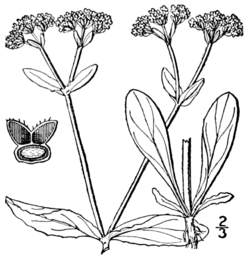Biology:Valerianella umbilicata
| Valerianella umbilicata | |
|---|---|

| |
| Scientific classification | |
| Kingdom: | Plantae |
| Clade: | Tracheophytes |
| Clade: | Angiosperms |
| Clade: | Eudicots |
| Clade: | Asterids |
| Order: | Dipsacales |
| Family: | Caprifoliaceae |
| Genus: | Valerianella |
| Species: | V. umbilicata
|
| Binomial name | |
| Valerianella umbilicata (Sullivant) Wood
| |
| Synonyms[1] | |
| |
Valerianella umbilicata, known by common name navel cornsalad, is a dicot, annual plant within the genus Valerianella and the family Caprifoliaceae. It is native to the Eastern North America and some parts of Canada and has no known uses other than being slightly edible.[1]
Description
Navel cornsalad is an herbaceous succulent annual.[2] It has dichotomously branched leaves that are attached along the stem rather than attached at the base. The leaves are spatulate, or "spoon-like" and are attached directly to the stem without a petiole. [2] It be anywhere between 3-6 dm tall.The petals are either white or pink to red,[3] and range from 2-5 mm long. The pollen bearing organs project out strongly. They are rare and found in fields, roadsides, and waste places.[2]
Distribution and habitat
Valerianella umbilicata is native to CAN N and L48 N (lower 48 states)[1] and has a known distribution that includes specimens from the central Piedmont to the southern Mountains. This species appears to be absent from the northern mountains and the Piedmont foothills.[4] V. umbilicata is rare and lives in damp and open environments. It thrives in disturbed areas such as damp meadows, bottomland openings, roadsides,[4] marshes, and fields.[3]
Human disturbances such as development, deforestation, and changes must be avoided by the Valerianella umbilicata species. This species has minimal comprehensive habitat information.[5]
Uses
There is no uses by wildlife for this species. There is no medical importance for this species either.[6] Corn salad is used as a vegetable so it has some economical importances.[7]
Conservation status
The global ranking on conservation status is G4-G5.[5][8] There is no US status,[5] however individual states have included a state rank. In Michigan, V. umbilicata is threatened (T) and legally protected by the state and holds a state rank of S2 - Imperiled.[5] North Carolina's state rank is SH - Endangered.[9] New Jersey's state rank is SH - Endangered.[1]
References
- ↑ 1.0 1.1 1.2 "USDA Plants Database". https://plants.usda.gov/home/plantProfile?symbol=VAUM.
- ↑ 2.0 2.1 2.2 Radford, Albert E.; Ahles, Harry E.; Bell, C. Ritchie (1968). Manual of the Vascular Flora of the Carolinas. Chapel Hill: University of North Carolina Press. pp. 997–998. ISBN 0-8078-1087-8. OCLC 355003. https://www.worldcat.org/oclc/355003.
- ↑ 3.0 3.1 "Valerianella umbilicata (navel corn-salad): Go Botany". https://gobotany.nativeplanttrust.org/species/valerianella/umbilicata/.
- ↑ 4.0 4.1 "Vascular Plants of North Carolina". https://auth1.dpr.ncparks.gov/flora/species_account.php?id=2767.
- ↑ 5.0 5.1 5.2 5.3 "Valerianella umbilicata (Corn salad) - Michigan Natural Features Inventory". https://mnfi.anr.msu.edu/species/description/15026/Valerianella-umbilicata.
- ↑ Les, Donald H. (2017-09-01), "Dicotyledons II", Aquatic Dicotyledons of North America (Boca Raton, FL: CRC Press): pp. 45–86, doi:10.1201/9781315118116-3, ISBN 9781315118116, http://dx.doi.org/10.1201/9781315118116-3, retrieved 2022-04-14
- ↑ Allaby, Michael, ed (2019). A Dictionary of Plant Sciences. Oxford University Press. doi:10.1093/acref/9780198833338.001.0001. ISBN 978-0-19-883333-8. http://dx.doi.org/10.1093/acref/9780198833338.001.0001.
- ↑ "NatureServe Explorer 2.0". https://explorer.natureserve.org/Taxon/ELEMENT_GLOBAL.2.150813/Valerianella_umbilicata.
- ↑ "Vascular Plants of North Carolina". https://auth1.dpr.ncparks.gov/flora/species_account.php?id=2767.
Wikidata ☰ Q15395425 entry
 |


